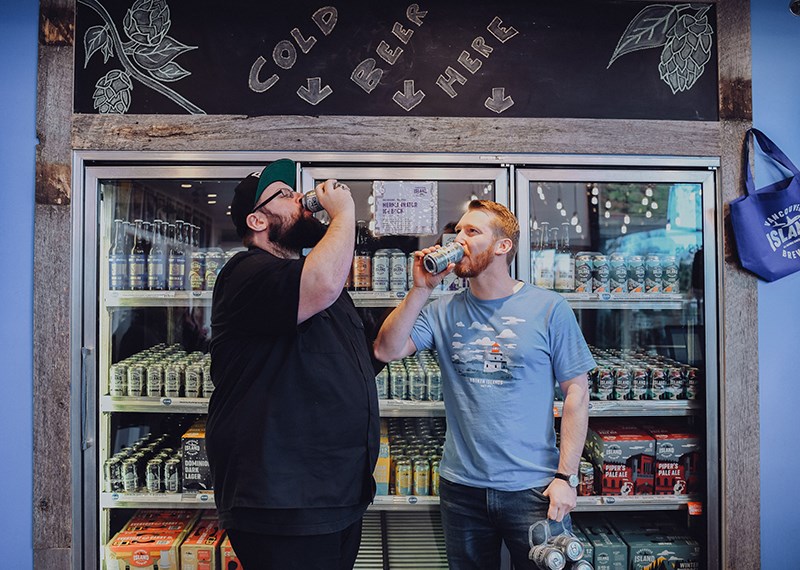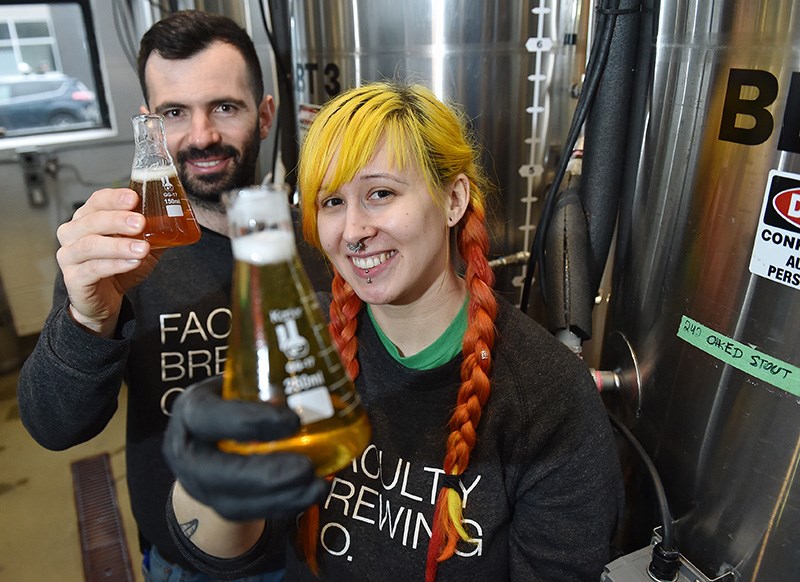In March, 2018, Dalhousie University released the findings of a national data survey announcing that nearly 40 per cent of British Columbians under the age of 35 are either vegan or vegetarian. The highest percent in the country, in fact.
Now, do you think all those plant-based folks know their beer might not be vegan-friendly? Possibly not. So, what make separates a vegan and non-vegan beer? The answer is a little fishy.
Isinglass is a substance derived from fish (mainly sturgeon) bladders, and used as a fining agent to clarify beer in certain brewing styles. During the filtration process, fining agents like isinglass are added to help remove access yeast and particles. Gelatin, made from animal collagen, is also routinely used as a fining agent.
Another substance not suitable for a vegan diet that shows up in craft beer is lactose sugar, which is made from cow’s milk. Brews like milk stouts or milkshake IPAs use lactose sugar to add residual sweetness to the beer.
However, B.C. craft breweries are increasingly looking at alternative ingredients and brewing methods to bring consumers cruelty-free beer.
is one of them.

“For a number of reasons, one of the moves we wanted to make was to get a centrifuge for doing clarity,” explains VIB marketing manager Chris Bjerrisgaard. “Basically instead of filtering our beer, we are spinning it clear to remove any hard particulates, yeast or leftover hops and what it does is it allows us to clarify our beer without using fining agents, and that’s what actually makes the beer vegan.
“It’s obviously micro-levels, but it’s something that would restrict someone who is strict in their veganism from being able to drink all beer on the market.”
On a similar vein, Â鶹´«Ă˝Ół»Island Brewing is also in the process of going kosher.
“You can’t certify yourself as vegan and there’s no real certifications of quality in brewing in a lot of ways,” Bjerrisgaard says. “We felt that this was an opportunity for us to both reach out to a market in the Jewish community but also to give that stamp of approval that our products are high-quality and they meet a set of standards.”
Winterlicious is coming
Since its inception in 2015, Doan’s Craft Brewing Company has been producing 100 per cent vegan beers. But their plant-based efforts had remained rather low-key until this past fall when Doan’s released their in collaboration with Monashee Spirits Craft Distillery.
“We went the vegan route from day one,” says Doan’s co-founder and co-owner Evan Doan. “Michael, my brother, and one of the other co-founders has been vegan for a number of years now and I, myself, have been vegetarian my entire life. We’ve tried to experiment and do beers that would normally not be vegan, like using lactose sugar which is a dairy product, and try to do those style with vegan options.”
Doan created Winterlicious by taking Monashee Spirits’ non-dairy creme base, which contains vanilla bean, coffee bean, white whisky and brown rice sugar, and put that into a rice stout.
“This is a beer that vegans typically wouldn’t be able to drink and now they can enjoy,” he says.
Winterlicious was one of the most successful responses the East Â鶹´«Ă˝Ół»brewery has had for a single beer. Even the skeptics were pleasantly surprised.
“Most people who normally wouldn’t be into that style of beer would taste just a sample, and still buy a six-pack. They loved it,” says Doan. “So it was really fun to see people’s reactions, whether they are vegan or not.”
Doan’s is currently in the middle of a rebrand, but once that design refresh is complete you can expect to see their vegan efforts proudly displayed.
“All of our products will have a little vegan symbol, showing no animal by-products,” Doan says. “So we are taking the next step and making our vegan stance more prominent in our brand.”
Everyone’s welcome
Meanwhile, brewer Jacquie Loehndorf’s beer at Vancouver’s , save of the Sourweisse, is entirely vegan-friendly.
“A big value that we have as a company is [our commitment to] inclusivity,” says Faculty owner Mauricio Lozano. “We wanted to make sure that everyone is welcome to the brewery. Starting with the layout of the space, all the way to making our beers vegan.”
Faculty uses a purified colloidal solution of silicic acid in water to clarify its beer.
“It works almost as well as animal-based products like gelatin finings or isinglass and we are achieving a really nice clear beer that is vegan and unfiltered and fresh as it should be,” he says.
Doan’s Craft Brewing uses the same product as Faculty — called Biofine — and centrifuges its beers instead of using isinglass or gelatin.
In the end, what Â鶹´«Ă˝Ół»Island Brewing, Doan’s and Faculty all have in common—with the exception of producing great craft brews—is their commitment to quality beer that everyone can enjoy, vegan or not.
“We’ve had a great response and we get a lot of thank-yous,” says Lozano. “People always thank us for thinking of them, and for making our space a place for everyone. When you accommodate for a minority, everybody wins.”
Ěý
Ěý



